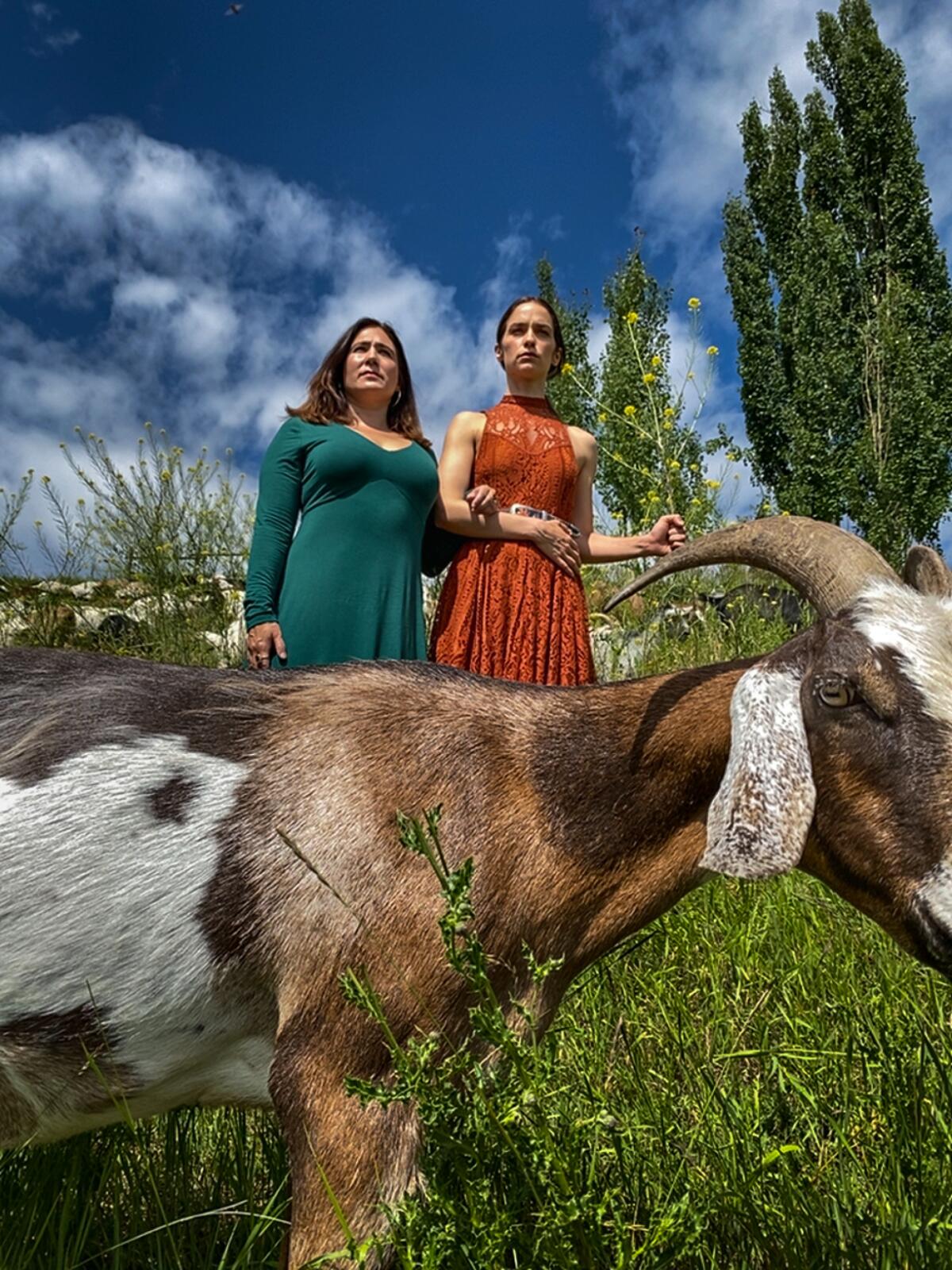‘Wynonna Earp’s’ creator didn’t know the end was near. So she wrote it like she did
- Share via
This story includes spoilers for the Season 4 finale of “Wynonna Earp.”
The heart of “Wynonna Earp” has always been the relationships between its characters, so it was only fitting that the series ended its run on Syfy with a beautiful wedding.
Waverly Earp (Dominique Provost-Chalkley) and Nicole Haught (Katherine Barrell) finally tied the knot in Friday’s Season 4 finale, but theirs was not the only relationship to reach a happy, well-deserved milestone. Wynonna (Melanie Scrofano) and Doc Holliday (Tim Rozon) have also taken a solid step forward in their relationship.
“I wanted to leave these characters in a place where they saw that happiness and joy is worth fighting for,” said showrunner Emily Andras. “Even if it’s just a moment in time.”
Whether or not this episode marks the conclusion of the series remains uncertain, as the series still searches for a U.S. distributor for a potential fifth season. Although Andras had no news about the future of the show, she said that there are more stories to tell about Wynonna and her family.
As its fourth and maybe final season ends Friday, “Wynonna Earp” deserves credit for refusing to “bury its gays” — and turning anxiety into comfort.
“I don’t know what’s going to happen to the fate of the show but we aren’t necessarily going anywhere,” said Andras. “We are very cognizant of the fandom. We have each other. We have friendships and relationships. I think there’s a million different ways to tell Earp stories, and I hope that people continue to find ‘Wynonna Earp,’ one way or another.”
Andras and Scrofano discussed the finale, Wynonna’s Season 4 struggles and more with The Times. The conversation has edited for clarity and condensed.
Before the mid-season premiere, there was an announcement that these would be the last episodes on Syfy. Had you already known this when you started the season? Did this influence the arc?
Andras: I did not know. I 100% did not know and it’s been a real rollercoaster. But my gut told me that I had to make sure Season 4 was satisfying for the fans, our Earpers who had worked so hard to bring us back after our financial troubles after Season 3.
I was determined one way or another to make sure that it was emotionally fulfilling in a way I hadn’t been in previous seasons where I was like, “I am 100% ending on 116 cliffhangers and I dare you to cancel us. Good luck.” I felt like that wouldn’t be fair this time given how hard the fans had rallied for us, so I just wasn’t willing to take the same chance.
But you can’t write from a place of fear at the end of the day. You have to honestly write the absolute best story you can, hopefully give the cast the best stuff to perform, make it fun, make it stuff they haven’t tried before — that’s all you can do. You can’t constantly hum and haw your chances or you’ll just never get out of that paralysis. You kind of have to ‘Art of War’ it. You kind of have to write as if you’re already dead and just be like, “maybe we can do a trivia night with a cannibal.”

At what point did you know that the wedding was how you wanted to end this season?
Andras: I will be honest, I think if I had known for sure that we were going to have another season, I might have risked delaying the wedding. I might have drawn out the suspense, drawn out the drama. But in my heart, I just felt like we couldn’t risk it for the audience. And weirdly, I hoped it was a gift for the cast — both the wedding and the Doc-Wynonna story.
I wanted to leave these characters in a place where they saw that happiness and joy is worth fighting for. Even if it’s just a moment in time. That’s worth it. It doesn’t have to be perfect. There’s no guarantee it will last. But it is still so worth it to fight for your moment, to fight for what you want, to fight for someone who gets you.
I don’t want to oversell it, but I feel like we need to reward the people who have stayed with us with something that is a moment of love and joy after such a hard fight both on and off-screen.
Season 4 of Syfy’s “Wynonna Earp” has been nearly two years in the making — thanks to financial woes, its passionate fan base and the COVID-19 pandemic.
And who would have guessed Wynonna would be the bridezilla?
Scrofano: I totally wouldn’t have predicted that Wynonna would have been the bridezilla and I love that so much. Because when I read [the script], it made perfect sense. [Wynonna] fights for her sister and this time it’s not about demons. Because she has to give her away, it’s going to damn well be exactly what her sister wants and deserves.
I’m so happy that it wasn’t Wynonna getting married in a way because we’ve seen that plenty of times on television. I’ve even played that plenty of times.
Wynonna and Doc’s relationship also hit a milestone in the finale. Melanie, how was it to have Wynonna finally say the words “I love you”?
Scrofano: Man, I was so stressed about it. It had to be the most weighty thing she’s ever said. Because it is really a moment of “I’m going to stop f— around [and] I’m going to start maybe giving myself the life I deserve.” It just had so much weight behind it. I read it [in the script] and I was like, “Oof, don’t mess that one up.”
It’s just [Wynonna] finally stopping the self-sabotage and taking a chance on something that’s scarier to her than all the demons in the world. But I think watching her sister fearlessly devote herself to someone else kind of inspired her to take a chance.
Why was it important in Season 4 to see Wynonna confront some more difficult things about herself, like her drinking and whether Peacemaker really is good for her?
Andras: Wynonna the character had earned those conversations. As you grow up, a lot of those destructive behaviors are a lot less cute. That sounds kind of disparaging and I don’t mean it like that. I just mean it’s hard to justify drinking and partying and being reckless as you get older and you get more responsibilities.
I trusted that we — meaning us and the audience — loved Melanie and loved Wynonna so much that we could really delve into those darker corners of herself in the same way I thought it was OK that Wynonna made a bad choice and shot someone in the back. I would have been very cautious to do that with her character in the first season, but that’s the beauty of growing up with these characters and falling in love with them.
Nobody else has to carry the burden that Wynonna has to carry. She does it so that no one else has to. But for people to say, “Well, we don’t approve of the way you’re doing it and we don’t like that you drink yourself to death,” if I was Wynonna, I would be like, “I do that because I just shot someone in the face today.” Like, this is what it takes to be a hero and I feel like sometimes that’s a story that isn’t always explored, especially with women.
There’s a whole culture now of like, wine moms and how that’s cute. When I go to Walmart, every pair of pajamas says “wine mom” [or] “wine o’clock” on it. And there is a real thing we’re not talking about with that kind of collision of what women are doing to cope with the burden of their everyday lives. Under the pandemic, I feel like a lot of women have been forced to take on more than their fair share. And the coping mechanisms that people take to have a moment of joy or a moment of escape are problematic, but at the same time, you could argue it’s systemic. I got really metaphorical instead of about Wynonna, but she feels very relatable, is what I mean.
Melanie Scrofano on her journey to directing a Season 4 episode of “Wynonna Earp.”
Melanie, what did you think about engaging with those themes through Wynonna?
Scrofano: I was riveted by what Em is saying, with women having to take on more than they usually do, because it is just really timely, that episode of “Wynonna.” Anybody who’s dealt with any type of addiction knows that the first thing you do when you get stressed or anxious or whatever is you turn to your comfort, right? And for her, that’s drinking — and for a lot of people right now, that’s drinking.
Over the course of playing Wynonna, what were the biggest surprises from the writers for you?
Andras: Remember when we made you get pregnant in real life?
Scrofano: [How they responded to] that was honestly for me the most surprising. They weren’t afraid to take it there. And that really threw me for a loop. Like, I was expecting to have to hide [my pregnancy]. Or, I don’t know, Wynonna kind of sits in a rocking chair while everybody else [handles things]. The fearlessness of that type of decision was really inspiring to me. Not just because it made me feel validated as a human being. Like, “You’re good as you are, you’re a full human and we’ll use it all,” which has been relentlessly apparent on this show. “Come as you are and that’s good enough for us.” And I was so grateful to have that.
Emily, did how you envision Wynonna and her story change from when you first pitched the show to now?
Andras: It changed for me in the sense that it has exceeded all my wildest, most arrogant expectations for the show. I just think I have never worked with a performer of the caliber that is Melanie Scrofano. I have never felt like I shared a brain so closely with an actress who knew exactly what I was trying to do with the jokes and the dialogue and hopefully mostly trusted me. And her craft, just her ability to turn on a dime from vulnerable to mercenary to hilarious to messy, it let me write anything I wanted, in a weird way. It freed me.
When I think of Season 1, it was a struggle. It was a struggle to get to it really being the best show under the circumstances I wanted it to be and I feel triumphant. I feel like we didn’t compromise about the female characters, we didn’t compromise about the LGBTQ representation, we didn’t compromise about making the male heroes relentless feminists, we didn’t compromise on the humor, we didn’t compromise on the super-duper cheesy heart of it.
For better, for worse, it has arrived as something that people fell in love with, and nobody loved it more than I did.
More to Read
The complete guide to home viewing
Get Screen Gab for everything about the TV shows and streaming movies everyone’s talking about.
You may occasionally receive promotional content from the Los Angeles Times.








